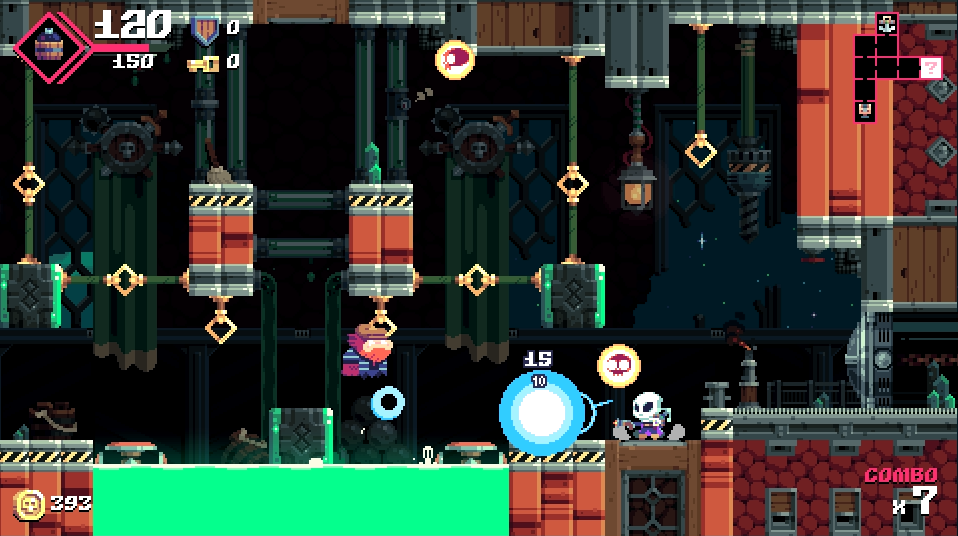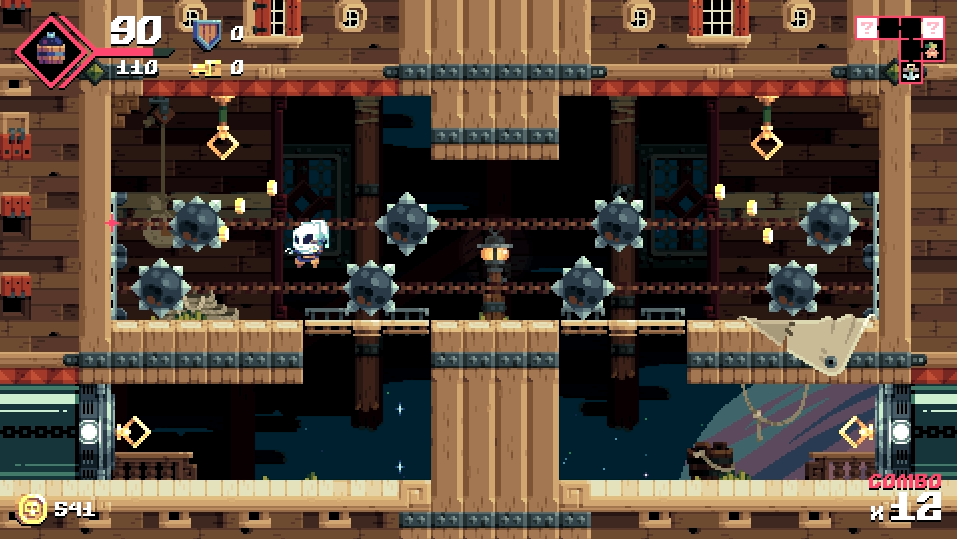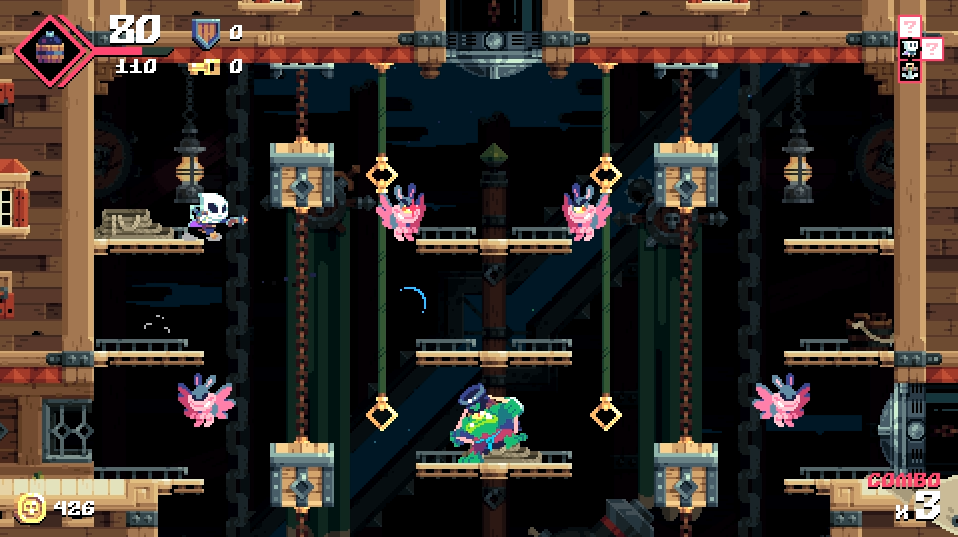Our Verdict
A satisfying, moreish take on the roguelike formula, and one that's most likely to appeal to genre naysayers.
PC Gamer's got your back
What is it? A cheerful shooter rogue-like for people easily frustrated by roguelikes.
Reviewed on: Core i7-4720HQ, 16 GB RAM, GeForce GTX 980M (See our recommended gaming laptops, and PC build guides)
Price: $15/£11
Developer: Tribute Games
Publisher: Tribute Games
Multiplayer: None
Link: Official site
Buy it: Humble Store
Read our affiliates policy.
Nowadays it’s hard to get excited about a new roguelike. There’s a lot of them, and playing just one requires a lot of dedication. Oh, and Spelunky looms intimidatingly in the canon, an end-game boss that may never be smote. Some have come close: Enter the Gungeon, Rogue Legacy and Risk of Rain are all strong contenders. Joining this canon is Flinthook, a sidescrolling shooter-platformer by the team responsible for (the frankly disappointing) Mercenary Kings and (the frankly underrated) Ninja Senki DX.
You play as captain Flinthook, a cheerful looking space pirate hell-bent on plundering spaceships. These spaceships are composed of a series of randomised rooms throughout which you’ll shoot other space pirates (yes, it’s true: this is a pirate-versus-pirate videogame). Crucially, you’ll move through these environments using your grappling hook, which is the central requisite novelty at the heart of Flinthook.
This grappling hook pulls the player towards anchors strewn liberally throughout each room. The hook has a limited range, but it doesn’t bend or bow and there’s no cooldown. Basically, if you’re not moving around each room with the erraticness of a beheaded chicken, shooting and dodging bullets with your hook all the way, then you’re not playing the game properly. Chaining hooks together will provide a bit of momentum, but overall it’s a fairly straightforward traversal tool, albeit central to the game. When using the grappling hook in concert with the captain’s slowdown tool—which does have a short cooldown—I always felt like the most powerful combatant on the screen. It's the element that transforms Flinthook from a passing distraction into a potentially ruinous addiction.

Importantly, Flinthook isn’t a particularly punitive game. It waters down the roguelike template even more than the likes of Rogue Legacy, with certain unlockable perks available permanently. Meanwhile, once a new world is accessed it’s possible to start from there forever. Each world has a series of level-types which can be selected manually at the beginning of each game, and each has an indicator showing how difficult it’s going to be. In other words, a certain dreaded level theme isn’t going to take you by surprise like it can in other similar games.
And yet, Flinthook doesn’t feel like a Fisher Price roguelike or anything: it’s just structured in a way that won’t feel utterly punishing with each death. Many, including myself, will welcome the fact that it’s difficult to spend five minutes with this game without achieving something. Completing a level provides a unit of currency which can be used to unlock permanent abilities, such as higher health, more perk slots, or higher XP rewards, among many others. Overall, the only progress gated here is access to new worlds, which is achieved by accruing a certain number of Ghost Gems and facing off with a boss. Ghost Gems are rewarded with a completed level, but are taken away with each death, meaning you need to complete a number of levels without dying to make solid progress through the game.

One of my few beefs with Flinthook is that the layout of rooms tends to become pretty familiar, pretty quickly. It’s not really the type of roguelike you’ll play in order to find secrets though (even though they exist). It’s the combat and the upgrade system which is the real carrot-on-the-stick. Your plasma pistol isn’t particularly powerful, but the game’s insistence that you move acrobatically throughout each arena while using it means demolishing foes always feels graceful and impressive. It helps that Flinthook doles out treasure at an alarmingly rapid pace. The clink of gold coins spewing out of shattered jars is reason enough to keep playing this game.
It’s also very cheerful: I mean, even though it’s arguably the easiest 'roguelite' out there, it’s still time-consuming and often fury-inducing. But it’s time-consuming and fury-inducing in a much more tolerable way than some of its contemporaries, and while it can hardly boast the intricacy which keeps Spelunky at the top of the pack, it’s better to view Flinthook as a more-ish shooter rather than an elaborate, skill-based platformer. For those inclined to abandon a roguelike when the going gets tough, there’s still a marginal chance you’ll grow attached to Flinthook. It doesn’t add much to the genre, but its small tweaks and iterations work wonders.
A satisfying, moreish take on the roguelike formula, and one that's most likely to appeal to genre naysayers.

Shaun Prescott is the Australian editor of PC Gamer. With over ten years experience covering the games industry, his work has appeared on GamesRadar+, TechRadar, The Guardian, PLAY Magazine, the Sydney Morning Herald, and more. Specific interests include indie games, obscure Metroidvanias, speedrunning, experimental games and FPSs. He thinks Lulu by Metallica and Lou Reed is an all-time classic that will receive its due critical reappraisal one day.


